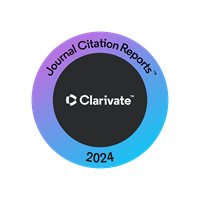<b>Microbial variables and productivity of rice under different soil and water managements</b> - DOI: 10.4025/actasciagron.v29i3.281
Abstract
This experiment aimed to verify the effects of differents soil (MS) and water (WM) managements on upland rice cultivation through microbial biomass carbon (MBC) quantification, evoluted CO2 (C-CO2), metabolic quotient (qCO2), micorrhization and crop yield. Cultivar IAC 202 was used. The experimental design was a randomized complete block design, with 3 SM: no-tillage (NT), heavy disk + leveling disk harrowing (HL), and chisel plowing + leveling disk harrowing (CL), plus 3 WM: no irrigation (WD0), water depth 1 (WD1), irrigation at the reproductive and maturation periods and water depth 2 (WD2), irrigation throughout the rice cycle, with four replications. The microbiological variables showed sensitivity in detecting differences between good periods and irregular rainfall, where the NT + WD1 showed best results. However, under the viewpoint of productivity and economic viability, CL + WD1 propitiated the most satisfactory results for rice culture.Downloads
Download data is not yet available.
Published
2007-11-14
How to Cite
Santos, T. E. B. dos, Nakayama, F. T., Arf, O., & Cassiolato, A. M. R. (2007). <b>Microbial variables and productivity of rice under different soil and water managements</b> - DOI: 10.4025/actasciagron.v29i3.281. Acta Scientiarum. Agronomy, 29(3), 355-360. https://doi.org/10.4025/actasciagron.v29i3.281
Issue
Section
Crop Production
DECLARATION OF ORIGINALITY AND COPYRIGHTS
I Declare that current article is original and has not been submitted for publication, in part or in whole, to any other national or international journal.
The copyrights belong exclusively to the authors. Published content is licensed under Creative Commons Attribution 4.0 (CC BY 4.0) guidelines, which allows sharing (copy and distribution of the material in any medium or format) and adaptation (remix, transform, and build upon the material) for any purpose, even commercially, under the terms of attribution.
2.0
2019CiteScore
60th percentile
Powered by 

2.0
2019CiteScore
60th percentile
Powered by 




















































